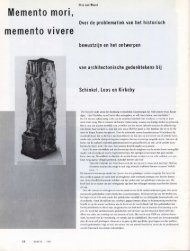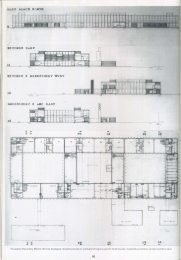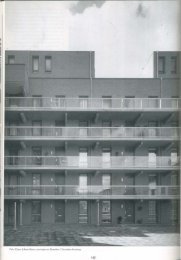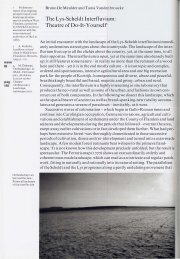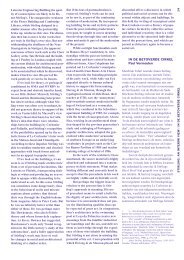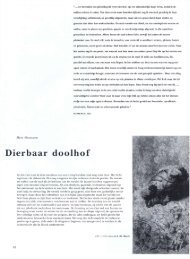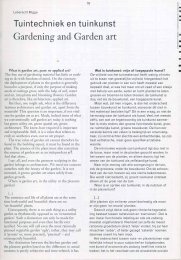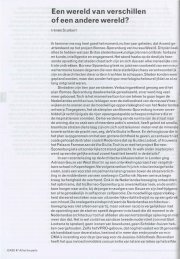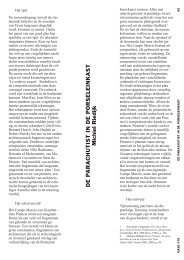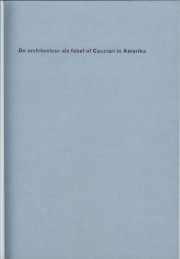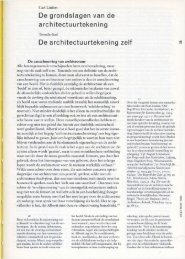Download PDF, 18 pages, 8.62 MB - OASE Journal for Architecture
Download PDF, 18 pages, 8.62 MB - OASE Journal for Architecture
Download PDF, 18 pages, 8.62 MB - OASE Journal for Architecture
You also want an ePaper? Increase the reach of your titles
YUMPU automatically turns print PDFs into web optimized ePapers that Google loves.
90<br />
his study of botanical gardens that their creators<br />
were driven by the desire to re-create the botanical<br />
totality of Eden. But if the projectors of these<br />
gardens were less certain about the zoology, the<br />
types of fauna, the <strong>for</strong>m of the garden could be<br />
imagined more easily. The botanical garden of<br />
Padova <strong>for</strong> example, which is one of the oldest<br />
botanical gardens in Italy, had the <strong>for</strong>m of a circle<br />
with an inscribed rectangle. It was in its layout a<br />
clear geometrical allusion not only to eroticism -<br />
the circle being a symbol <strong>for</strong> the female, the<br />
square representing the male - but also to the<br />
mathematics of the cosmos. The circle symbolised<br />
the world, the inscribed square Paradise. Near by,<br />
in Mantova, the botanical garden of the Gonzagas<br />
was laid out according to schemes with an astrological<br />
meaning. A solid wall protected the garden<br />
from the outside, even if this was not strictly necessary,<br />
given its location within the palace.<br />
In all these examples there is a sense of<br />
acknowledging that however precise the order, it<br />
could only be fragmentary. The certainty of its<br />
physical <strong>for</strong>m was totally lost. This is one of the<br />
reasons <strong>for</strong> the plurality in its interpretation. Paradise<br />
does not know one history, but many. None<br />
of these histories is ultimately verifiable because<br />
with the concept of origin as an Ursprung (the<br />
first leap into the dark) as Walter Benjamin would<br />
have called it, Paradise had been ontologically lost<br />
and become a sort of black spot in human<br />
scheppers van deze tuinen gedreven werden door het<br />
verlangen de botanische compleetheid van Eden te herscheppen.<br />
Maar al waren de ontwerpers van deze tuinen<br />
misschien minder zeker over de zoologie, de diersoorten<br />
die in het paradijs leefden, de vorm van de tuin was makkelijker<br />
te bepalen. A Is we de botanische tuin van Padua<br />
als voorbeeld nemen- een van de oudste botanische<br />
tuinen van ltalie- zien we dat deze een cirkelvorm had<br />
met een ingeschreven vierkant. Het antwerp ervan was<br />
een duidelijke geometrische verwijzing, niet aileen naar<br />
de erotiek- met de cirkel als symbool van het vrouwelijke<br />
en het vierkant van het mannelijke- maar ook naar<br />
de mathematica van de kosmos. De rondheid van de cirkel<br />
symboliseerde de wereld, het ingeschreven vierkant<br />
het paradijs. Niet ver daarvandaan, in Mantua, lag de<br />
botanische tuin van de Gonzaga's, met een indeling val<br />
astrologische symboliek. De tuin was door een massieve<br />
muur van de buitenwereld afgeschermd, al was dit niet<br />
strikt noodzakel ijk, gezien het feit dat hij binnen het<br />
paleis lag.<br />
Uit al deze voorbeelden spreekt een zekere erkenning<br />
van het feit dat hoe precies de ordening ook is, zij altijd<br />
slechts fragmentarisch kan zijn. Over de concrete vorm<br />
van deze ordening bestond geen enkele zekerheid. Dit is<br />
een van de redenen dat er zoveel interpretaties bestaan.<br />
Het paradijs kent niet een geschiedenis, maar vele. Geen<br />
van deze geschiedenissen is uiteindelijk verifieerbaar,<br />
aangezien door het concept van de Oorsprong<br />
(Ursprung, de eerste sprang in het duister), zoals Walter<br />
Benjamin het genoemd zou hebben, het paradijs als con-<br />
De val van de mens en de verdrijving uit het paradijs I Fall of Man and<br />
Expulsion from Paradise, uitlfrom: Liber Chronicarum, 1493<br />
De verdrijving uit het paradijs I Expulsion from Paradise,<br />
uitlfrom: I. David, Duodecim specula, 1610



